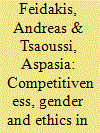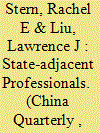| Srl | Item |
| 1 |
ID:
091738


|
|
|
| 2 |
ID:
163689


|
|
|
|
|
| Summary/Abstract |
Ideally, justice is a universal good: the law protects equally the rights of the rich and powerful, the poor and marginal. In reality, the major share of legal services goes to business entities and wealthy people and the prestige and prosperity to the lawyers who serve them. This essay deals with the history of access to justice–chiefly civil justice–and with the role of lawyers and organized legal professions in promoting and restricting that access. In the last century, legal professionals and others have taken small steps to provide access to legal processes and legal advice to people who could not otherwise afford them. By doing so, they have inched closer to the ideals of universal justice. Though the organized bar has repeatedly served its own interests before those of the public, and has restricted access to justice for the poor, it has been a relatively constructive force.
|
|
|
|
|
|
|
|
|
|
|
|
|
|
|
|
| 3 |
ID:
161396


|
|
|
|
|
| Summary/Abstract |
Beyond the esoteric deliberations of Islamic jurists and their exegesis of criminal and private law doctrines, Iranian law lives a life of its own. It is a life of routine practices of judges, court clerks, lawyers and clients, each of whom is striving to turn the law to their own advantage. It is also a life of contested legality, a relentless struggle over the right to determine the law in a juridical field which is infused with strife and hostility. These conflicts are reproduced daily as two competing conceptions of law, and their corresponding perceptions of legality clash in pursuit of justice. The Iranian judiciary’s concept of law, its reconstruction of Islamic jurisprudence and methods of dispensing justice, which on the surface are reminiscent of Max Weber’s “qādi-justice,” collide with the legal profession’s formal rational understanding thereof. However, Iranian judges are not Weberian qādis, and the legal profession is not a homogenous group of attorneys driven by a collective commitment to the rule of law. To understand their conflict, we need to explore the mundane workings of the legal system in the context of the transformation of Iranian society and the unresolved disputes over the direction of its modernity.
|
|
|
|
|
|
|
|
|
|
|
|
|
|
|
|
| 4 |
ID:
181141


|
|
|
|
|
| Summary/Abstract |
This article complicates the conventional wisdom that Chinese lawyers are either politically liberal activists or apolitical hired guns by training our attention on the group of lawyers who choose to stand adjacent to the state and participate in governance. Through an examination of how and why winners of the state-sanctioned Outstanding Lawyer Award participate in politics, we illustrate how state-adjacent lawyers provide the state with information and persuade others to behave in ways the state considers appropriate. Although proximity to power affords some social and professional benefits, award winners are also motivated by a commitment to improving Chinese society. By highlighting the political role played by lawyers who serve as a bridge between state and society, we open the door to future research on the relationship between the state and professionals in other industries and countries, and call for continued attention to how inequality shapes opportunities for political participation in China.
|
|
|
|
|
|
|
|
|
|
|
|
|
|
|
|